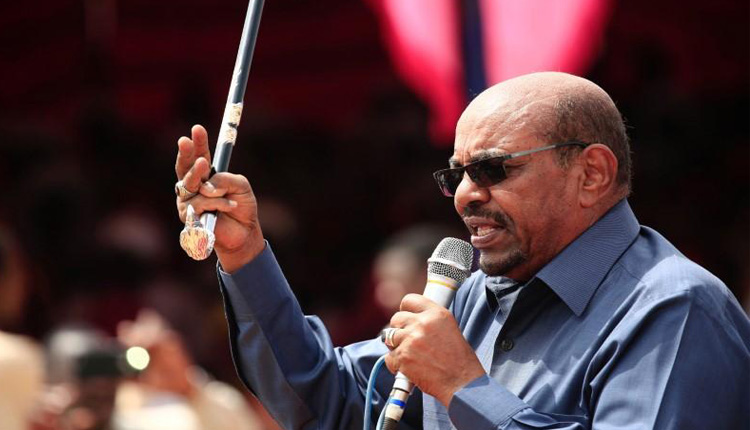Over 22 years Mohamed Mahmoud deposited his law practice’s cash in a bank near his Khartoum office. Now, fearful that shrinking limits on withdrawals will mean he cannot get his money out, he keeps it in a safe behind his desk.
Restrictions on how much cash is available to commercial banks are among measures aimed at curbing rampant inflation and addressing an economic crisis that could derail President Omar al-Bashir’s plan to extend his nearly three decades in power.
Though banks have not announced specific withdrawal limits, some have fallen in recent weeks to as little as 500 Sudanese pounds ($17.12) per day.
“Even if this office is not secure from theft or from a fire, it’s still better than putting it in the bank,” said Mahmoud, fishing a small band of banknotes out of a filing cabinet.
Last week, 11 months after the United States lifted 20-year-old trade sanctions, Bashir dissolved his government, citing Sudan’s “state of distress and frustration”, and slashed a third of ministries to cut costs.
At over 60 percent, Sudan’s inflation rate is among the world’s highest, while its currency buys fewer than half as many dollars on the black market — which has effectively replaced the formal banking system — as it did a year ago. There are intermittent shortages of fuel and food, and the scrapping of bread subsidies in January, doubling the price, drew hundreds of protesters onto the streets.
The economy has been starved of hard currency since South Sudan seceded in 2011, taking the lion’s share of oil, once a major export. Though gold mining has since boomed, officials acknowledge that most of the precious metal is smuggled out of the country.
In December, the International Monetary Fund said central bank reserves stood at about $1.1 billion, or just enough for seven weeks of imports — roughly half the three months usually regarded as adequate.
Economists say foreign investors and banks are put off by Sudan’s continued designation by Washington as a state sponsor of terrorism, alongside Iran, North Korea and Syria.
That listing is expected to be reviewed, but it makes Sudan ineligible for badly needed debt relief and financing from lenders like the IMF and the World Bank.
“There was a moment of beautiful optimism at the end of last year, when sanctions went away and we thought everyone is going to be all over us like a rash in terms of wanting to invest,” said Sam Bodley Scott, head of strategy at DAL Foods, one of Sudan’s biggest food producers.
“But unfortunately, the local and domestic economic pressures, and the challenges associated with that, have far outweighed the benefits of the end of sanctions.”
STORING VALUE
Across the street from Khartoum’s gold market, black market currency dealers lean on car hoods waving banknotes to attract clients. Their numbers have risen despite a government crackdown, as money moves out of the banking system and demand for hard currency increases.
“Last year you might have found three or so people on this street selling black market currency, but now there’s 10 to 20 at a time,” said one dealer.
Sudan’s central bank has devalued its pegged currency from 6.7 to about 30 pounds per dollar in the last year, but the black market rate is still lower, at about 42 pounds.
Currency dealers say dollar demand has increased as people convert their cash to preserve value.
“There’s no confidence in the political system and the economy, and it’s driven a lot of people to put foreign exchange in their homes and mattresses and safes,” said Zuheir Saeed, CEO of Saeed Group, one of Sudan’s largest conglomerates. “Now even housewives when they have a surplus are putting it in dollars.”
Two bankers told Reuters that new deposits are declining as people and businesses hesitate to put their money in the bank.
Outside Amir Mohamed Othman’s Khartoum shop, safes sit stacked on the sidewalk, within sight of customers queuing at a bank on the same street. Sales have jumped to three or four a day from just one a month earlier this year, overtaking his usual trade in furniture.
MAXIMUM ANGER
Coca-Cola distributor DAL Foods and Saeed Group, Sudan’s top biscuit maker, say sales of the snacks they produce have held up during the downturn as people substitute them for foods they can no longer afford.
“For many people a midday meal has become a biscuit with milk or tea,” said Saeed.
Coke revenues have stayed steady, DAL’S Scott said, adding: “People just see it as a cost-effective way to get a carbohydrate and keep going.”
Although the streets have been quiet since January’s bread protests, the crisis is a problem for Bashir, whose ruling party said last month it would nominate him to run again in a 2020 election, which would require a constitutional amendment.
The president, who seized power in a 1989 military coup, told the nation in an address this week that spending by the new cabinet would be kept “to a minimum”.
Memories of 2013, when security forces are estimated to have killed up to 185 people after thousands took to the streets to decry fuel price hikes, may be keeping protests in check.
But journalist and commentator Faisal Saleh said people were beginning to feel they have nothing to lose.
“This is the worst economic crisis we’ve ever faced. I’m afraid we’re facing a total collapse of the economy,” he said.
“People have reached their maximum level of anger and you can expect anything after that. I don’t know what they will do.”
Source: Reuters
